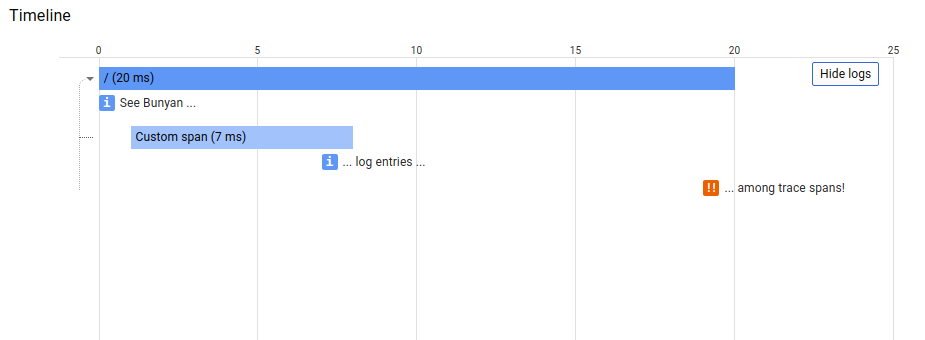
This module provides an easy to use, higher-level layer for working with Stackdriver Logging,
compatible with Bunyan. Simply attach this as a transport to your existing Bunyan loggers.



Stackdriver Logging stream for Bunyan
Read more about the client libraries for Cloud APIs, including the older
Google APIs Client Libraries, in Client Libraries Explained.
Table of contents:
Quickstart
Before you begin
- Select or create a Cloud Platform project.
- Enable the Stackdriver Logging for Bunyan API.
- Set up authentication with a service account so you can access the
API from your local workstation.
Installing the client library
npm install @google-cloud/logging-bunyan
Using the client library
const bunyan = require('bunyan');
const {LoggingBunyan} = require('@google-cloud/logging-bunyan');
const loggingBunyan = new LoggingBunyan();
const logger = bunyan.createLogger({
name: 'my-service',
streams: [
{stream: process.stdout, level: 'info'},
loggingBunyan.stream('info'),
],
});
logger.error('warp nacelles offline');
logger.info('shields at 99%');
Using as an express middleware
NOTE: this feature is experimental. The API may change in a backwards
incompatible way until this is deemed stable. Please provide us feedback so
that we can better refine this express integration.
We provide a middleware that can be used in an express application. Apart from
being easy to use, this enables some more powerful features of Stackdriver
Logging: request bundling. Any application logs emitted on behalf of a specific
request will be shown nested inside the request log as you see in this
screenshot:

The middleware adds a bunyan-style log function to the request object. You
can use this wherever you have access to the request object (req in the
sample below). All log entries that are made on behalf of a specific request are
shown bundled together in the Stackdriver Logging UI.
const lb = require('@google-cloud/logging-bunyan');
const express = require('express');
async function startServer() {
const {logger, mw} = await lb.express.middleware();
const app = express();
app.use(mw);
app.get('/', (req, res) => {
req.log.info('this is an info log message');
res.send('hello world');
});
logger.info({port: 8080}, 'bonjour');
app.listen(8080, () => {
console.log('http server listening on port 8080');
});
}
startServer();
Error Reporting
Any Error objects you log at severity error or higher can automatically be picked up by [Stackdriver Error Reporting][error-reporting] if you have specified a serviceContext.service when instatiating a LoggingBunyan instance:
const loggingBunyan = new LoggingBunyan({
serviceContext: {
service: 'my-service',
version: 'my-version'
}
});
It is an error to specify a serviceContext but not specify serviceContext.service.
Make sure to add logs to your [uncaught exception][uncaught] and [unhandled rejection][unhandled] handlers if you want to see those errors too.
You may also want to see the [@google-cloud/error-reporting][@google-cloud/error-reporting] module which provides direct access to the Error Reporting API.
LogEntry Labels
If the bunyan log record contains a label property where all the values are strings, we automatically promote that
property to be the LogEntry.labels value rather
than being one of the properties in the payload fields. This makes it easier to filter the logs in the UI using the labels.
logger.info({labels: {someKey: 'some value'}}, 'test log message');
All the label values must be strings for this automatic promotion to work. Otherwise the labels are left in the payload.
Formatting Request Logs
To format your request logs you can provide a httpRequest property on the bunyan metadata you provide along with the log message. We will treat this as the [HttpRequest][http-request-message] message and Stackdriver logging will show this as a request log. Example:

logger.info({
httpRequest: {
status: res.statusCode,
requestUrl: req.url,
requestMethod: req.method,
remoteIp: req.connection.remoteAddress,
}
}, req.path);
The httpRequest proprety must be a properly formatted [HttpRequest][http-request-message] message. (Note: the linked protobuf documentation shows snake_case property names, but in JavaScript one needs to provide property names in camelCase.)
Correlating Logs with Traces
If you use [@google-cloud/trace-agent][trace-agent] module, then this module will set the Stackdriver Logging [LogEntry][LogEntry] trace property based on the current trace context when available. That correlation allows you to [view log entries][trace-viewing-log-entries] inline with trace spans in the Stackdriver Trace Viewer. Example:

If you wish to set the Stackdriver LogEntry trace property with a custom value, then write a Bunyan log entry property for 'logging.googleapis.com/trace', which is exported by this module as LOGGING_TRACE_KEY. For example:
const bunyan = require('bunyan');
const {LoggingBunyan, LOGGING_TRACE_KEY} = require('@google-cloud/logging-bunyan');
const loggingBunyan = LoggingBunyan();
...
logger.info({
[LOGGING_TRACE_KEY]: 'custom-trace-value'
}, 'Bunyan log entry with custom trace field');
Samples
Samples are in the samples/ directory. The samples' README.md
has instructions for running the samples.
The Stackdriver Logging for Bunyan Node.js Client API Reference documentation
also contains samples.
Supported Node.js Versions
Our client libraries follow the Node.js release schedule.
Libraries are compatible with all current active and maintenance versions of
Node.js.
Client libraries targetting some end-of-life versions of Node.js are available, and
can be installed via npm dist-tags.
The dist-tags follow the naming convention legacy-(version).
Legacy Node.js versions are supported as a best effort:
- Legacy versions will not be tested in continuous integration.
- Some security patches may not be able to be backported.
- Dependencies will not be kept up-to-date, and features will not be backported.
Legacy tags available
legacy-8: install client libraries from this dist-tag for versions
compatible with Node.js 8.
Versioning
This library follows Semantic Versioning.
This library is considered to be General Availability (GA). This means it
is stable; the code surface will not change in backwards-incompatible ways
unless absolutely necessary (e.g. because of critical security issues) or with
an extensive deprecation period. Issues and requests against GA libraries
are addressed with the highest priority.
More Information: Google Cloud Platform Launch Stages
Contributing
Contributions welcome! See the Contributing Guide.
Please note that this README.md, the samples/README.md,
and a variety of configuration files in this repository (including .nycrc and tsconfig.json)
are generated from a central template. To edit one of these files, make an edit
to its template in this
directory.
License
Apache Version 2.0
See LICENSE










